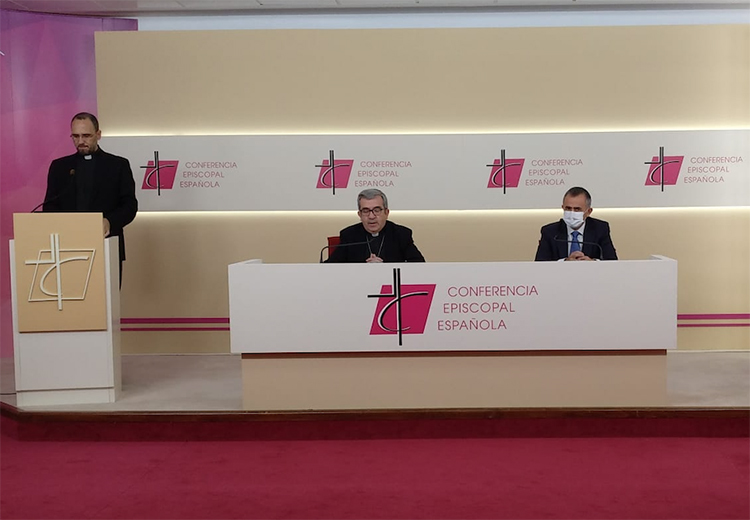These two issues were the subject of specific notes - one on the education law and the other on the situation of overflow of migrants in the Canary Islands - in which the prelates expressed their concerns and proposals.
An Assembly marked by the pandemic
The coronavirus pandemic has given rise to the least traditional of the Plenaries held so far: of the 72 bishops attending, only thirty attended in person and after undergoing, at the beginning of the week, an antigen test in which, anecdotally, the last bishop to undergo the test was positive and is now confined although asymptomatic, as the spokesman of the Spanish Episcopal Conference explained at the final press conference. In fact, the opening speech of Card. Omella, president of the EEC first intervention as President,"Reborn among all", focused on a reflection on the current situation marked by the impact of COVID. In it, he expressed "our condolences and hope" to the families of all the deceased and our solidarity and commitment to those who are suffering the health, economic and social consequences caused by this pandemic.
The bishops were able to address these consequences from two perspectives: one focused on the economic and social field, with a paper by Antonio GaramendiThe Chairman of the CEOE, on the consequences of COVID 19 from a macroeconomic perspective, which was complemented by the work of the Episcopal Commission for Social Pastoral and Human Promotion, presented by Bishop Atilano Rodríguez Martínez The result of dialogue between the Commission's agencies and departments in order to obtain direct and accurate information on the situation of the most vulnerable people in society. "We wanted to put a face to this problem."Argüello stressed.
Concerns about the Celaá law
The implementation of the approval process of the LOMLOE or Celaá law has been one of the hot topics at this meeting of the Spanish bishops, who have expressed their concerns in the following note On the new education law.
The situation in which this law leaves the subject of Religion, and not only that, but the evident curtailment of parental freedoms and rights, the loss of jobs and the total control of education by the State are some of the main concerns The Assembly participants' comments and suggestions.
All this together with the rejection of dialogue by the State in the process of drafting a legislative text that the bishops hope can change, at least in its most controversial points, throughout the approval process.
The migration crisis
The final press conference also served to unveil the Note Regarding the situation of immigrants in the Canary Islands which is based on the communiqué issued by the dioceses of this area in view of the uncontrolled arrival of migrants to the Canary coasts and the inhuman situation in which most of them find themselves, once they have arrived on Spanish soil. In this sense, the bishops have recalled the need for countries to work to "seek the right balance between the protection of the rights of citizens and the guarantee of reception and assistance to migrants" and have encouraged the bishops to "seek the right balance between the protection of the rights of citizens and the guarantee of reception and assistance to migrants".hristian communities a "to offer a unique witness of fraternity and citizenship in the welcoming, care and promotion of those who arrive and in moral and political action against the causes of so much suffering.".
The financial issue
Among the topics discussed, the economy also played a key role in this Assembly since, in an ordinary way, in the autumn Plenary Session, the 2019 balance sheets and budget liquidation, the criteria for the constitution and distribution of the Interdiocesan Common Fund and the EEC budgets and the agencies that depend on it by 2021.
There were also no surprises in the appointments in the economic area, where Fernando Giménez Barriocanal has been renewed as vice-secretary for Economic Affairs of the Spanish Episcopal Conference (CEE) for the next five years.












